Daily Current Affairs and GK | 30 September 2020

Main Headlines:
- 1. Defence Ministry launched Defence India Startup Challenge-4 for self-reliance.
- 2. NSS REPORT: TIME USE IN INDIA- 2019 (JAN-DEC 2019)
- 3. International Translation Day: 30 September
- 4. NHPC Limited signs MoU with Ministry of Power.
- 5. Transgender Persons (Protection of Rights) Rules 2020 issued.
- 6. China’s unilaterally defined Line of Actual Control (LAC) never accepted by India.
- 7. Shekhar Kapur appointed as President of FTII Society & chairman of FTII Governing Council.
- 8. COVID-19-Safe guidelines booklet released for Industry.
- 9. An MoU signed between Denmark and Gujarat in Water Sector.
- 10. Plants of Lantana being removed in Sajjangarh wildlife sanctuary.
- 11. Sonia Gandhi asks certain states to pass laws under Article 254 (2) of the Constitution.
Happy February get 35% Off
Use Coupon code FEB26
1. Defence Ministry launched Defence India Startup Challenge-4 for self-reliance.
- Defence Minister Shri Rajnath Singh has launched the ‘Defence India Startup Challenge (DISC 4)’ in an event for Innovations for Defence Excellence (iDEX) in New Delhi.
- He also released the guidelines for the iDEX4Fauji initiative and Product Management Approach (PMA).
- Under it, there were eleven challenges thrown to startups, innovators, and MSMEs to provide their innovative ideas.
- iDEX:
- It is an initiative of the Department of Defence Production to foster innovation in the Indian Defence sector.
- It was launched by PM Modi in April 2018.
- It is managed and funded by Defence Innovation Organization.
- iDEX4Fauji:
- It is a programme under iDEX that will support the innovation identified by the members of the Indian arms force.
- It is a first of its kind initiative.
- It will also encourage frugal innovation.
- It will make soldiers part of the innovation process in the Defence sector.
- Product Management Approach:
- For the development of the 'right product and the product right’ guidelines were issued by the Defence Ministry.
- It aims to monitor the product development milestones achieved by iDEX winners against the requirements set by the Services.
2. NSS REPORT: TIME USE IN INDIA- 2019 (JAN-DEC 2019)
- The first Time Use Survey (TUS) has been conducted by the National Statistical Office (NSO) to measures the participation rate and time spent on paid activities, care activities, unpaid activities.
- It has been conducted during the period from January 2019 to December 2019.
- The prime objective of this survey is to measure the participation of men and women in paid and unpaid activities.
- Features of the Survey:
- It was conducted on 82,897 rural and 55,902 urban households.
- Data was collected for time use of 24 hours.
- Result of Time use is presented by considering all the activities in the time slots.
- Key indicators of the time use survey are:
- Participation rate in a day
- Average time spent in a day per participant
- Average time spent in a day per person
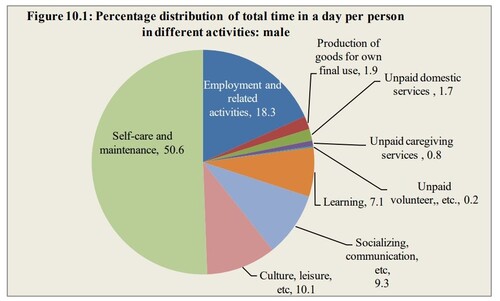
(Source: TUS Report)
- Highlights of the Survey:
- In India, the total participation rate in employment and related activities is 38.2%. While participation is 17.1% in the production of goods for own final use.
- The total participation rate in unpaid domestic services for household members is 53.2% (participation rate is very high in females). On the other hand, the participation rate is 20.7% in unpaid caregiving services for household members.
- Participation rate is almost double in unpaid activities than in paid activities.
- Participation rate is 100% in self-care and maintenance.
- Participation rate in learning is very high for age of 6-14 years and it is low in 15-29 years of age.
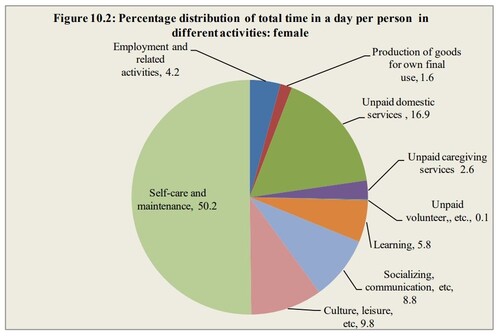
(Source: TUS Report)
3. International Translation Day: 30 September
- International Translation Day is celebrated annually on 30 September, the day dedicated to St. Jerome.
- St. Jerome is considered as the patron saint of translators.
- He translated the Bible from Greek manuscripts of the New Testament into Latin.
- He died on 30 September 420.
- In 2017, UN General Assembly adopted a resolution to declare 30 September as UN International Translation Day.
- International Translation Day is an opportunity to honor the role of language professionals in connecting nations and to foster peace.
- The year 2019 was celebrated as the International Year of Indigenous Languages.
- Theme 2020: “Finding the words for a world in crisis”
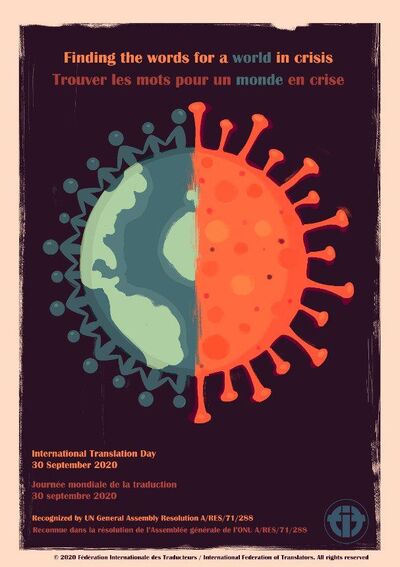
(Source: IFT)
4. NHPC Limited signs MoU with Ministry of Power.
- NHPC Limited (earlier named as National Hydroelectric Power Corporation) has signed Memorandum of Understanding (MoU) with Ministry of Power.
- The signed MoU has milestones or significant events related with restoration of two units (unit 1 and 2) of Chamera-II Power Station. The MoU includes Assets Monetization parameters.
- The signed MoU provides detailed targets to be achieved during the year 2020-21. The targets are shown in given table.
|
Detailed targets included in MoU between NHPC Limited & Ministry of Power |
|
|
Electricity generation target under Excellent rating |
27500 Million Units (MUs). Last year, this target was 26000 MUs. |
|
Excellent Targets for Revenue from Operations (Net) |
Rs. 8900 crore |
|
Operating Profit as a percentage of Revenue from Operations (Net) |
38.00% |
|
Profit After Taxes (PAT) / Average Net Worth |
10.50% |
|
Four other targets included in MoU:
|
|
- Chamera-II Power Station is built on river Ravi. It is located in Chamba, Himachal Pradesh.
- NHPC Limited is a Scheduled ‘A’ Mini Ratna Public Sector Enterprise incorporated in 1975 and headquartered in Faridabad, Haryana.
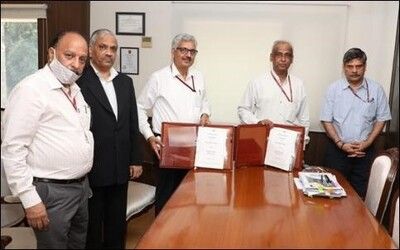
(Source: PIB)
5. Transgender Persons (Protection of Rights) Rules 2020 issued.
- Union Ministry of Social Justice and Empowerment has issued Transgender Persons (Protection of Rights) Rules 2020.
- The draft rules were issued in July and now final rules have been notified on 25 September.
- As per the rules, Transgender persons having a desire to declare their sex can do so without medical examination.
- Under the rules, application for declaring gender will be made physically till the time online system becomes ready.
- The rules allow parents to apply on behalf of their child. Under the rules, transgender persons who have officially recorded change in gender are not required to apply for certificate of identity.
- According to the rules, state governments will form welfare boards for transgender persons and help them in accessing center’s schemes and welfare measures.
- State governments will also prevent discrimination of transgender persons in organizations or educational institutions under their jurisdiction.
- States will also establish Transgender Protection Cell. State’s DGP and District Magistrates will be responsible for Transgender Protection Cell. It will monitor cases against transgender persons.
- The rules provide for construction of transgender-sensitive infrastructure such as separate wards in hospitals and washrooms in two years from the notification of rules.
- In November 2019, government has passed Transgender Persons (Protection of Rights) Act, 2019.
6. China’s unilaterally defined Line of Actual Control (LAC) never accepted by India.
- India has never accepted the unilateral LAC (Line of Actual Control) defined by China in 1959.
- Line of Actual Control:
- It is a line that separates India controlled territory from Chinese-controlled territory.
- India-China LAC is divided into three parts
- Arunachal and Sikkim Border
- Uttarakhand and Himachal Pradesh Border
- Ladakh Border
- The major disagreement between India and China is on the western side of LAC.
- The term Line of Actual Control is used by Chinese Premier Zhou Enlai in 1959 in a note to Jawaharlal Nehru and is formed after the Sino-India war of 1962.
- LAC gets legal recognition in India-China bilateral agreement signed in 1993 and 1996.
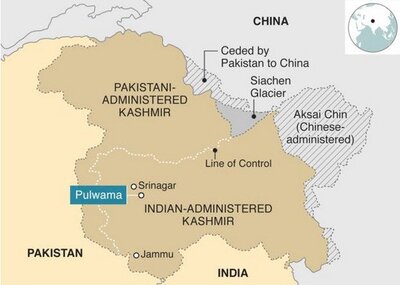
(Source: BBC)
7. Shekhar Kapur appointed as President of FTII Society & chairman of FTII Governing Council.
- Shekhar Kapur, a well-known Filmmaker, is designated as president of FTII Society & chairman of FTII Governing Council.
- He has directed many films in his career.
- Film and Television Institute of India (FTII):
- It was established in 1960 and previously known as ‘Film Institute of India’.
- It is an autonomous Society under the Ministry of Information and Broadcasting, run by a Governing Council.
- It is a center for excellence in audio visual media.
- The Governing Council is the apex body which is responsible for making all policies decision for this institute.

(Source: News on AIR)
8. COVID-19-Safe guidelines booklet released for Industry.
- Health Minister Dr. Harsh Vardhan and Labour Minister Santosh Kumar Gangwar have released a booklet on ‘COVID-19- Safe Workplace Guidelines for Industry’.
- These guidelines will help workers and employers to identify the risk levels of COVID-19 at Workplace.
- It will work as comprehensive planning for employers to reduce the risk of COVID-19.
- It will help to make a workplace safe and infection-free from COVID-19.
- Ministry of Health and Family Welfare:
- Health and Family Welfare Minister is Dr Harsh Vardhan.
- It is responsible for all planning and programs related to health and family welfare in India.
- It has two departments:
- Department of Health and Family Welfare
- Department of Health Research
9. An MoU signed between Denmark and Gujarat in Water Sector.
- A MoU is signed between Gujarat Sewerage Board and water supply with the Danish Water Forum.
- It will promote technology exchange training, capacity building, knowledge exchange, cooperation in the water supply.
- It will help in wastewater treatment and water management.
- This MoU is signed for fiver year to develop an Indo-Danish water technology alliance.
- It will help to achieve the United Nations’ Sustainable Development Goal -6.
- United Nations’ Sustainable Development Goal -6: Ensure availability and sustainable management of water and sanitation for all.
- Gujarat:
- It is a coastal state of India.
- Capital: Gandhinagar
- Governor: Acharya Dev Vrat, Chief Minister: Vijay Rupani
- Lok Sabha seats: 26, Rajya Sabha seats: 11
- Gir National Park is located in Gujarat.
10. Plants of Lantana being removed in Sajjangarh wildlife sanctuary.
- Plants of invasive species, Lantana are being removed in Sajjangarh wildlife sanctuary in Rajasthan.
- A campaign is being carried out to remove Lantana plants and native species are being planted on cleared land. Lantana was first introduced in 1807.
- Lantana (Lantana camara) is a shrub or small-sized invasive plant. It prevents growth of grass and other small sized plants (shrubs).
- Its leaves and fruits (ripe berries) have toxic substances that affect animals and biodiversity.
- Invasive species are species of organisms (plants or animals), which are not native to a place. They show high growth after their introduction in a non-native place and affect local flora, fauna and biodiversity of a region.
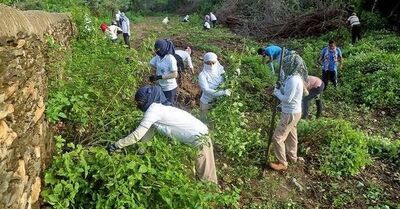
(Source: The Hindu)
11. Sonia Gandhi asks certain states to pass laws under Article 254 (2) of the Constitution.
- Sonia Gandhi has asked Chief Ministers of Punjab, Rajasthan, Chhattisgarh and Pudducherry to pass laws under Article 254 (2) of the Constitution and cancel three farm laws passed by centre.
- Under Article 254 (2), state governments can pass a law on subjects in Concurrent List. The laws passed by state governments under Article 254 (2) may contradict a Central law. However, the laws must get assent of the President.
- In 2014, Rajasthan government has passed laws under Article 254 (2) Factories Act, Industrial Disputes act, and Contract Labour Act passed by Centre.
- To cancel Farmers Produce Trade and Commerce (Promotion and Facilitation) Act, 2020 passed by centre, Punjab government may change Agriculture Produce Market Committee Act to declare entire State as a principal mandi yard.
-of-the-constitution-pendulumedu.jpg)
(Source: The Hindu)





 29 September 2020 Current Affairs
29 September 2020 Current Affairs 








Comments